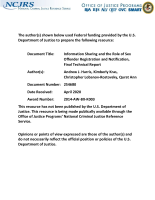Sex offender registration
Effects of South Carolina's Sex Offender Registration and Notification Policy on Deterrence of Adult Sex Crimes
Effect of Statewide Residency Restrictions on Sex Offender Post-Release Housing Mobility
Failure to Register as a Sex Offender: Is it Associated with Recidivism?
Examining the Correlates of Sex Offender Residence Restriction Violation Rates
Geography and Public Safety: A Quarterly Bulletin of Applied Geography for the Study of Crime & Public Safety, Volume 2, Issue 1
Information Sharing and the Role of Sex Offender Registration and Notification, Final Technical Report
Information Sharing and the Role of Sex Offender Registration and Notification, Executive Report
Sex Offenders in the Community: Post-Release, Registration, Notification and Residency Restrictions
The management of sexual offenders in the community post-release is an issue of increasing concern to law enforcement, policymakers and the public. In recent years, efforts to strengthen registration and notification have been enhanced. At the same time, comparatively little attention has been paid to related matters, such as how residency restrictions may impact offenders' efforts to find stable work and living arrangements once they are released from prison, whether rates of recidivism have changed, and whether these policies increase the safety of potential victims.


